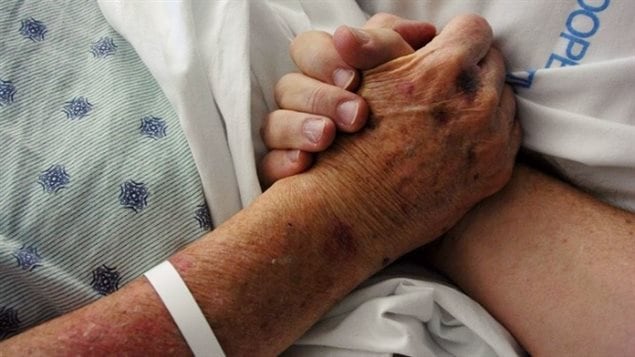Doctor-assisted suicide will be available in Sherbrooke, Quebec in February 2016. The option was the result of a vote at the Maison Aube-Lumiere palliative care centre where staff responded 61 per cent in favour, and the board voted unanimously.
It’s a first in Canada. The CEO of the centre, Elizabeth Briere said the service will be available on February 1st, 2016, just 5 days before the ban on doctor-assisted suicide is lifted in the rest of Canada. The right to end one’s life with the help of a doctor will be available in Quebec in December 2015.
Dr. Richard Haber is a pediatrician and teacher of medical students and residents at McGill University. He is moderating a panel discussion on Saturday in an effort he says, to clear up some of the confusion and misunderstanding around the issues of euthanasia and doctor assisted suicide.
ListenHe is opposed to the recent development in Canadian society, and is still hoping the new federal government will invoke the notwithstanding clause to prevent doctor-assisted suicide.
“As a teacher of residents and medical students I’m appalled that we would have to even have this discussion with them.”
Euthanasia and doctor assisted suicide have been removed from Canada’s criminal code. Freedom of conscience for doctors has not yet been assured, however, and in the province of Quebec, for example, doctors who do not want to participate in euthanasia, are obliged to refer a patient to another doctor. It’s a requirement many Quebec doctors reject.
“Dying well is one of the tasks we have as we get older” says Dr. Haber. And the reality of death and dying is becoming a more prominent issue in a society that now has more people over the age of 65 than under 15, according to the most recent statistics.
In February 2015, the Supreme Court ruled unanimously that Canadian adults suffering a “grievous and irremediable medical condition” can chose to end their lives with doctor-assisted suicide. The court explained that it was creating a new constitutional right to autonomy over one’s death in some circumstances.
But the court suspended its ruling for 12 months to allow the federal and provincial governments to draft new laws and establish rules.
Since then, groups and individuals for and against have made their feelings known. The previous Conservative government of Stephen Harper had convened a committee to study the issues, but it was suspended during the recent election campaign.
It remains to be seen where the new Liberal government of Justin Trudeau will stand on the issue, but in the meantime, the subject remains a controversial and divisive one in Canadian society







For reasons beyond our control, and for an undetermined period of time, our comment section is now closed. However, our social networks remain open to your contributions.